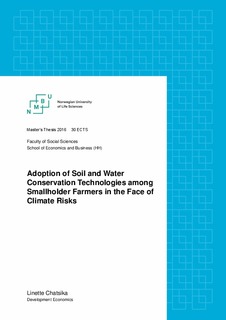| dc.description.abstract | Using plot level farm household survey data, this paper aims at highlighting the role of SWC technologies in the face of climate risks using organic manure as an example of most widely adopted SWC technology. It underscores the need to enhance the adoption of organic manure among smallholder farmers in Malawi as a means of increasing household’s resilience to prolonged dry spells. It investigates factors affecting households adoption decisions of organic manure and the potential effect of organic manure in improving maize yield when prolonged dry spells occur. To assess the factors that affect adoption of organic manure, the paper uses a binary probit model. While the effect of manure on yield was measured as treatment effect on the treated (ATT). Since adoption of manure suffers endogenous problems, due to the fact that in adoption studies, households and farm plots are not randomly assigned to groups as adopters or non-adopters but rather, they make their own choices to adopt or not, or plots are systematically selected based on their characteristics resulting in selection bias. The study attempeted to control for this endogeneity by using minimum-biased and corrected-bias estimators to calculate the ATT. The study concludes that higher household labor endowment enhances the probability of adoption of organic manure while higher opportunity cost of labor reduces the probability of adoption organic manure. Implying that market imperfections are constraining adoption of organic manure, that calls for policies that reduce market imperfections. The study did also find a positive effect of organic manure during dry spells, that on average manure increased maize productivity by 31%. | nb_NO |
